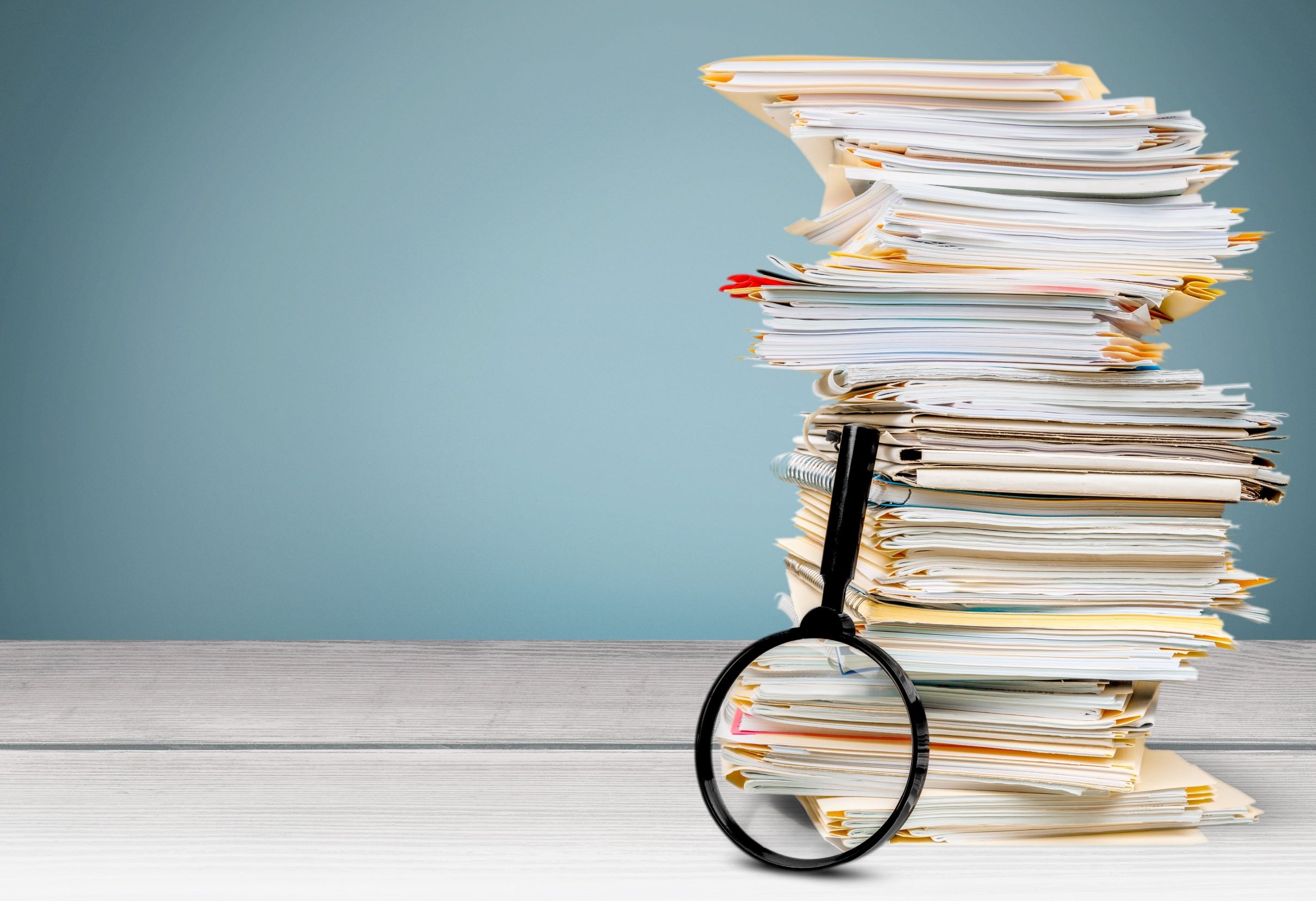Spring is here and that means spring cleaning for many of us! Here are some record retention rules to guide you on how long you should keep your personal financial documents.
Personal organization often takes the forefront when spring begins. Spring cleaning season often focuses on the areas we forget about the rest of the year. That could be a dusty ceiling fan or the pile of receipts and bank statements sitting in a desk drawer.
I know from personal experience the feeling you have once you have completed cleaning, organizing, and purging unnecessary items. It’s a sense of accomplishment and relief.
At Access Wealth, we frequently receive questions about personal retention policies. This article provides insight into how long you should keep financial records, bank statements, and purchase receipts. But first, let’s review one of the most important reasons for organizing and purging your files.
Why It’s Important to Shred Documents
Two words: Identity Theft. Financial documents contain a treasure trove of information for thieves. Bank account numbers, credit card account numbers, birth dates, social security numbers, insurance policy numbers, and more are often listed on your documents. One of the easiest ways to avoid identity theft is to ensure you shred every piece of paper that contains Personally Identifiable Information (PII) about you and your loved ones.
Furthermore, people often overlook the danger of leaving financial statements lying around the house. Unfortunately, this leaves you vulnerable should a contractor, cleaning person, or dishonest house guest stumble across the documents.
Here’s How Long You Should Keep Financial Records
Income tax returns and supporting documentation. The general rule for how long to keep income tax returns and their supporting documentation is seven years. The IRS has three years to audit a tax return with the following exception: underreported income greater than 25% has a six-year statute of limitations. Fraud, however, does not have a time limit. Supporting documentation includes W-2 support, 1099 statements, purchase and sale confirmations for investments sold outside of retirement accounts, and acknowledgment letters from charities.
Bank statements. Now that most people have online access to their bank accounts, there is no reason to maintain paper copies of your monthly bank statements. However, if you plan to apply for a mortgage or other type of loan, we recommend keeping three months of bank statements in paper format. Should you require statements that cannot be obtained online, banks will furnish copies upon request.
ATM receipts. You can shred your ATM receipts after you have balanced your checkbook.
Cancelled checks. How long you should keep cancelled checks depends on what they paid. If needed to support an income tax deduction, keep your cancelled check for seven years. You may destroy all other checks once your checkbook is balanced.
Credit card and sales receipts. Keep credit card receipts and sales receipts until the appropriate statement is received and reviewed. You may also want to keep them until the warranty on the product expires, or you can no longer return the item. Remember, though; you must maintain receipts for seven years if you deduct the items on your tax return.
Credit card statements. Keep credit card statements for three months.
Pay stubs. If year-to-date information is reflected on the most recent pay stub, the individual statements are not needed throughout the year. Save the most recent pay stub until your checkbook is balanced. However, if no year-to-date information is available on your pay stub, you should keep all pay stubs for the year until a W-2 is received. Note that three to six months of history may be requested if you are applying for a mortgage.
Medical bills and insurance. Insurance premium statements, doctor’s bills, prescriptions, and hospital bills should be kept for five years unless needed to support an income tax deduction (then keep for seven years).
Canceled insurance policies. Keep insurance policy statements for three years after cancellation.
Property and Casualty policies (home, renter, auto, and umbrella policies). When it comes to Property and Casualty (P&C) policies, such as homeowner insurance, renters insurance, auto insurance, and umbrella policies, you should keep copies of the insurance records for five years or until the asset is sold, whichever is less.
Satisfied loans. You should keep copies of statements from satisfied loans for seven years.
Purchase price of home and documentation of capital improvements. When it comes to documentation of your home’s purchase price and proof of capital improvements, maintain all documents until the home is sold. However, if you have taken a related income tax deduction, you must keep these documents for seven years.
Mortgage documents. Maintain copies of mortgage documents for as long as the mortgage is open. Once the mortgage is paid off, maintain the mortgage records for seven years.
Utility bills. Keep utility bills for three months unless you need to support an income tax deduction; then keep copies of utility bills for seven years.
Warranty documents. Keep warranty documents for as long as you own the product.
Investment documents. Capital gains and 1099 Forms should be maintained for seven years with the corresponding tax return. Confirmations for all trades in non-retirement accounts should be retained until the asset is sold and then included in the tax return support and held for an additional seven years.
Automobile records. Maintain auto records for as long as you own the car. However, if you need to support an income tax deduction, maintain auto records for seven years.
Accident reports and claims. Maintain copies of accident reports and accident claims for seven years.
Charitable contributions. When it comes to charitable donations, maintain receipts and acknowledgment letters for seven years. Store this information with the applicable income tax return.
Keep These Documents Forever
There are some documents that you should never throw away. Documents you should retain forever include:
Birth certificates, social security cards, adoption paperwork, citizenship papers, education records, professional license records, military records, marriage licenses, divorce decrees, and death certificates should be kept in a secure location forever.
Wills, Trusts, Powers of Attorney, and Advance Medical Directives should be kept permanently or until they are replaced with updated versions.
The Safest Way to Dispose of Sensitive Documents
Tearing up your documents and placing them in the recycling bin or trash is never sufficient. Dumpster-diving identity thieves root through trash because they know people throw away documents into their regular garbage containers. Shredding is the safest way to dispose of any document containing Personally Identifiable Information.
Home-use shredders can be purchased virtually everywhere (e.g., Amazon, Staples, and Target, to name a few familiar retailers). If you do not have access to a shredder and do not want to purchase one, several public services are available. Secure shredding companies, office supply companies, and community shred events all provide individuals with options for safely destroying personal documentation. Access Wealth is happy to provide this service to clients, as well.
The Safest Way to Store Important Documents
Suppose you need to keep paper copies of documents that are difficult to replace, such as birth certificates, marriage certificates, and passports. In that case, we recommend purchasing a fireproof box or renting a safe deposit box.
For all other documents that can be downloaded or scanned, take advantage of our digital world. It’s perfectly acceptable to store your documents digitally. You can choose to purchase a physical hard drive that you keep in your home, but the safest way is to subscribe to a cloud-based service with security features built into the service. Using a cloud-based service means you won’t have to worry about a hard drive failing, getting lost, or being stolen. If you are looking for some options, check out this article by Techradar, a review of the best cloud storage services for 2021.*
The key to all of this is to maintain access to your important documents when you need them while storing them securely so that unscrupulous parties cannot access them.
*Access Wealth does not endorse Techradar or any of the products mentioned in their recommendations. We provide these resources for educational purposes only. Individuals should research to determine what is best for their needs.








